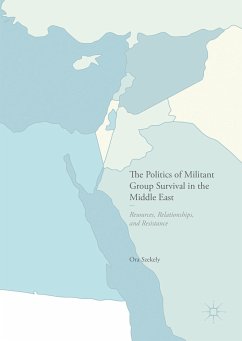
How Shiites Won the Battle Against Islamic State (eBook, PDF)
Kurds and Sunnis in Iraq
Versandkostenfrei!
Sofort per Download lieferbar
Statt: 107,65 €**
85,95 €
inkl. MwSt.
**Preis der gedruckten Ausgabe (Gebundenes Buch)
Alle Infos zum eBook verschenkenWeitere Ausgaben:

PAYBACK Punkte
43 °P sammeln!
The 2003 U.S. invasion of Iraq inadvertently changed the balance of power in favor of the Shiite community in Iraq and beyond. How Shiites Won the Battle Against Islamic State: Kurds and Sunnis in Iraq sheds light on how the Shiite-dominated government's sectarian policies deepened the divide between Iraq's major communities (Shiites, Sunni Arabs, and the Kurds) and led the country on the path of unending sectarian violence. This book explains how the government's failure to address Sunni Arab grievances led to the emergence of the radical Islamic State and convinced the Kurds that they could ...
The 2003 U.S. invasion of Iraq inadvertently changed the balance of power in favor of the Shiite community in Iraq and beyond. How Shiites Won the Battle Against Islamic State: Kurds and Sunnis in Iraq sheds light on how the Shiite-dominated government's sectarian policies deepened the divide between Iraq's major communities (Shiites, Sunni Arabs, and the Kurds) and led the country on the path of unending sectarian violence. This book explains how the government's failure to address Sunni Arab grievances led to the emergence of the radical Islamic State and convinced the Kurds that they could not coexist with Iraqi Arabs, who had been at each other's throats since 2003. This book notes that the emergence of a Shiite-dominated government in Baghdad was a historical event that led Iran to achieve its longstanding dream of extending its influence from Tehran to Baghdad, Damascus, and Beirut. How Shiites Won the Battle Against Islamic State places a special focus on how Shiite politicians' slick diplomacy and media campaigns diverted attention from its sectarian policies in 2014 by labeling the Sunni Arabs as terrorists and Kurdish leaders as corrupt separatists and troublemakers. This book also uncovers how the Iraqi government was able to garner Western military and political support to defeat ISIS and derail the Kurdish statehood movement.
Dieser Download kann aus rechtlichen Gründen nur mit Rechnungsadresse in A, D ausgeliefert werden.













